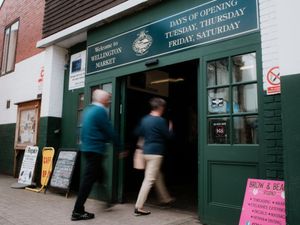Coronavirus: Councils clamp down on non-essential businesses continuing to flout lockdown restrictions
Civic leaders have today warned they will clamp down on non-essential businesses continuing to flout coronavirus lockdown restrictions throughout Shropshire and Telford.
Shropshire Council said it will take "enforcement action" against any business putting the most vulnerable in society at risk, while Telford & Wrekin Council has sent public protection officers to follow up reports of non-essential companies continuing to operate.
The latest development comes after confusion for many employees over whether their workplaces should be open, with a number of non-essential businesses still trading throughout the county despite the government's lockdown.
Some workers have been told they face losing their jobs if they stay at home, while others have been told they will only receive statutory sick pay if they self-isolate.
Karen Collier, regulatory services operations manager at Shropshire Council, said companies should "think twice" before breaking lockdown rules.
She said: "I urge all Shropshire businesses to do everything they can to limit the spread of Covid-19 and comply with the government restrictions.
"Think twice about every movement and interaction and ask yourself, is it really necessary?
"Preventing the spread of Covid-19 will save many lives and reduce the amount of time we spend in lockdown.
"If your business is permitted to stay open and movement is essential, you must determine the safest way to do this while adhering to government guidance. We must all act together now.
"We ask for your cooperation and will help with advice, but we will take enforcement action should the need arise to protect the most vulnerable in society."
Councillor Richard Overton, Telford & Wrekin Council’s cabinet member for enforcement, said: "The government has produced guidance stating what businesses must be closed. Our officers, with support from West Mercia Police, are out patrolling the borough to make sure that those businesses that have been instructed to close, comply with the government orders which are now law.
"Our officers and the police are undertaking these duties to ensure the safety of our public. We will take action on anyone who flouts the law."
A number of staff at manufacturing firms across Shropshire and Telford have contacted the Shropshire Star to express their surprise that their firms are still running as normal.
One Oswestry worker who wished to remain anonymous said it is "clear that profit is being put above workers' health and wellbeing".
They said: "We are being forced to still come to work, otherwise we won’t get paid. It is not essential work, but we cannot say anything or complain about the situation.
"We need clarification and guidance, and help to stop bosses forcing their workforce into work when the jobs they do are not essential."
A member of the public who spotted a builders' merchants operating in Shrewsbury said they find it "unbelievable" some businesses are continuing to put employees at risk.
They said: "I cannot see how purchasing bricks and sand can be classed as an essential and when employees bring up this issue, they are only offered statutory sick pay.
"I find it unbelievable that the company are making their employees choose between getting a wage and the well-being of their loved ones."
Meanwhile, an employee of a factory operating in Halesfield, Telford, said: "I think this is absolutely disgusting after Boris Johnson has ordered people to stay at home unless it’s necessary."
The following is from the government's "full guidance on staying at home and away from others", published on March 23:
"People can travel to and from work, but only where the work they do absolutely cannot be done from home.
"With the exception of the organisations covered in the section on closing non-essential shops and public spaces, the Government has not required any other businesses to close – indeed it is important for business to carry on.
"Employers and employees should discuss their working arrangements, and employers should take every possible step to facilitate their employees working from home, including providing suitable IT and equipment to enable remote working.
"Sometimes this will not be possible, as not everyone can work from home. Certain jobs require people to travel to their place of work – for instance if they operate machinery, work in construction or manufacturing, or are delivering front line services.
"Employers who have people in their offices or onsite should ensure that employees are able to follow Public Health England guidelines including, where possible, maintaining a 2 metre distance from others, and washing their hands with soap and water often for at least 20 seconds (or using hand sanitiser gel if soap and water is not available).
"Work carried out in people’s homes, for example by tradespeople carrying out repairs and maintenance, can continue, provided that the tradesperson is well and has no symptoms. Again, it will be important to ensure that Public Health England guidelines, including maintaining a two-metre distance from any household occupants, are followed to ensure everyone’s safety.
"No work should be carried out in any household which is isolating or where an individual is being shielded, unless it is to remedy a direct risk to the safety of the household, such as emergency plumbing or repairs, and where the tradesperson is willing to do so. In such cases, Public Health England can provide advice to tradespeople and households.
"No work should be carried out by a tradesperson who has coronavirus symptoms, however mild.
"As set out in the section on closing non-essential shops and public spaces, the Government has ordered certain businesses and venues to close."




